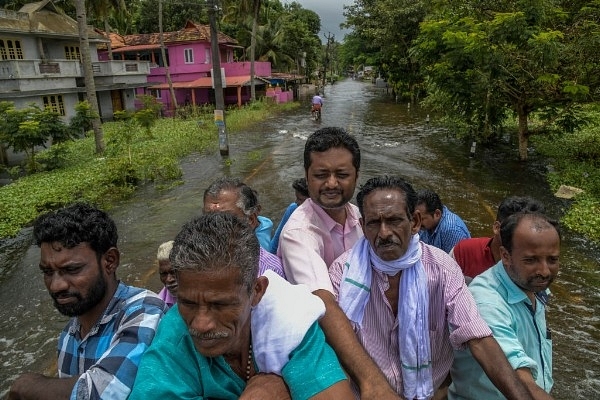Ideas
Kerala Flood Relief: Why India Should Turn Down Foreign Aid Offer
- Several countries, most notably the UAE, have come forward to offer aid to help Kerala recover in the aftermath of the floods.
- Reports have suggested that India may not be keen to accept any foreign aid – and there are good reasons why.

With the relief work underway in Kerala, the UAE has offered Rs 700 crore in assistance. (Atul Loke/Getty Images)
When India was offered aid by Japan and the United States of America (US) after floods in Uttarakhand had ravaged large parts of the state in 2013, India had rejected the help. The then-spokesperson of the External Affairs Ministry, Syed Akbaruddin, had said, “As a general policy in case of rescue and relief operations, we have followed the practice that we have adequate ability to respond to emergency requirements.”
India had also rejected US aid during the term of the Manmohan Singh government in the aftermath of the 2004 tsunami that struck India's eastern coast. The decision to reject foreign aid was seen as a move to project India as an economic power and not an impoverished nation that has to rely on foreign nations during emergencies.
Now, after the flooding in in Kerala has claimed close to 400 lives, and losses estimated at Rs 19,512 crore, according to Chief Minister Pinarayi Vijayan, the question of accepting foreign aid has once again come to the fore.
Considering its close association with Kerala, the United Arab Emirates (UAE) offered India Rs 700 crore in aid for the state to recover in the aftermath of the disaster. Vijayan and the Prime Minister both thanked the UAE for its gesture. Media reports suggest that India may reject the aid eventually, in line with the precedent set by former prime minister Singh. Such a move would be appropriate if we are to account for the rising stature of India, economically, in the world.
India is currently the sixth-largest economy in the world and the second-largest country in terms of population. In spite of the maze of rules and regulations it finds itself having to navigate, it has the means and the might to raise resources to surpass challenges such as the recent flooding in Kerala. Accepting foreign aid would call into question the ability of the fastest-growing major economy in the world to manage the aftermath of a natural disaster.
Foreign aid, though almost always offered with benign intentions, tends to lead to an informal obligation on the part of the receiving nation to pay back in some form or the other. If India were to accept disaster aid from any nation, that would hinder its ability to conduct its foreign policy with a free hand.
India has also not received substantial aid from major nations like the US, Japan, France, or Germany. According to a response to Parliament on 22 March 2017 by the Minister of State for External Affairs, General V K Singh, India has become a nation that has provided more aid to foreign nations than it has received in the past three years. As India grows in stature and economic strength, it should avoid taking any foreign aid for its domestic needs.
Both the centre and the state have done a good job in tackling the disaster so far. While the state has been at work on a war footing, accommodating over one million people in more than 3,000 shelters, the centre, too, has stepped in with Rs 600 crore in assistance.
The Chief Minister in an interview to the Economic Times expressed his gratitude for the prompt response from the centre.
Thus, there is no need to seek help from foreign nations.
If India rejects foreign aid for Kerala as suggested by media reports, it would be in sync with its rising international profile, economic heft, and its overall national interest.
Political parties in India must come to a bipartisan agreement on the matter of foreign aid with respect to Kerala and avoid a needless slugfest on the issue.
Support Swarajya's 50 Ground Reports Project & Sponsor A Story
Every general election Swarajya does a 50 ground reports project.
Aimed only at serious readers and those who appreciate the nuances of political undercurrents, the project provides a sense of India's electoral landscape. As you know, these reports are produced after considerable investment of travel, time and effort on the ground.
This time too we've kicked off the project in style and have covered over 30 constituencies already. If you're someone who appreciates such work and have enjoyed our coverage please consider sponsoring a ground report for just Rs 2999 to Rs 19,999 - it goes a long way in helping us produce more quality reportage.
You can also back this project by becoming a subscriber for as little as Rs 999 - so do click on this links and choose a plan that suits you and back us.
Click below to contribute.
Latest